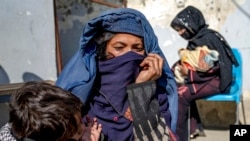Shaima, a local employee of the United Nations in Afghanistan, was shocked when she heard that she could not go to work because the Taliban had banned Afghan women from working with the U.N. agencies in the country.
"We were not expecting that such a thing would happen," said Shaima, who did not want her real name to be used for safety reasons.
"We thought that if women are barred from working in all other places, they will continue to work in the U.N. as it is leading the humanitarian efforts in the country … where most of the people depend on international assistance," she said.
U.N. officials said Tuesday that the Taliban informed the organization that its female Afghan employees would not be allowed to work in the country.
Shaima said the U.N. should press the Taliban to adhere to its promises of upholding women's basic rights.
She added that the international community "should not recognize" the Taliban as the legitimate government of Afghanistan until women are given their rights.
"Words are not enough. Practical measures are needed to force the Taliban to let women work," she said.
Taliban crackdown
Among the 4,000 employees of the U.N. in Afghanistan, 3,300 are Afghan nationals. Among them are about 400 Afghan women and 200 international female staffers.
In December 2022, the Taliban banned Afghan women from working with local and international nongovernmental organizations, but the U.N. was exempted from the ban.
At that time, the Taliban said the ban was imposed because female NGO employees were not wearing "proper hijab."
But Shaima said that she and all her female colleagues were following the dress code. "I was wearing [the] hijab," she said. "All my colleagues were wearing [the] hijab. We were wearing [the] hijab before the Taliban's takeover and after that."
She added that the "hijab is an excuse to stop women from working outside their houses."
After seizing power in August 2021, the Taliban imposed repressive restrictions on women, including banning them from working, attending secondary school or university, traveling unaccompanied for long distances, and going to public parks and gyms.
In a report released February 9, Richard Bennett, the U.N. special rapporteur on human rights in Afghanistan, considered the Taliban's restrictions an attempt to "erase women from all public spaces."
In an interview with the VOA Afghan Service in March, Bennett said the Taliban's "gender persecution is a crime against humanity."
Financial implications
A U.N. report released in January said that the Taliban's ban on Afghan women working with the local and international NGOs would worsen "the multiple overlapping humanitarian and economic crises" in Afghanistan.
The report also stated that the ban would complicate the outreach to 11.6 million women and girls who will need humanitarian assistance in 2023, and that 97% of the population is at risk of falling below the poverty line.
For Shaima, the only breadwinner in her family of seven, the ban was "disappointing" because she will no longer be able to support her family financially.
She worries all her efforts were in vain because she will not be able to work under the Taliban.
"We went through a lot to get an education in Afghanistan," Shaima said.
She added that Taliban measures barring Afghan women from work "would have [a] negative impact on me, all the women and the people of Afghanistan."
U.N. Secretary-General Antonio Guterres said in a tweet, "If this measure is not reversed, it will inevitably undermine our ability to deliver lifesaving aid to the people who need it."
Call for reversal
The U.N. said Wednesday that it would not comply with the Taliban's decision and called on the Taliban to reverse their decree.
U.N. spokesperson Stephane Dujarric said Thursday that the organization would continue engaging with the Taliban.
"Afghan women and men are essential to all aspects of the U.N.'s work in Afghanistan. Afghan women's meaningful participation is essential to reach safely and effectively populations in need with principled and quality assistance. Afghan women will not be replaced by men," Dujarric said.








